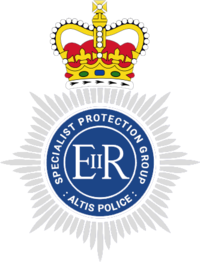Specialist Protection Group
The Specialist Protection Group (SPG) was founded and began official operations on the 2nd of October 2038. It was created from the remnants of the Diplomatic Protection Group (DPG) and was originally founded by Ace J Hunter, Ryker and Sciencefreak with the help from Tadworth and Gordon. It successfully passed its trial in Janurary 2039 and is continuing to be lead by SI James Johnson.
| Command | |
|---|---|
| Chief of Specialist Protection |
|
| Deputy of Specialist Protection |
|
What is the Specialist Protection Group
The Specialist Protection Group is an elite specialist unit. Different to other police units, it is a defensive unit opposed to an offensive unit. It is based on prediction, prevention and proactive policing, aiming to protect and provide security and order on Altis.
The SPG use special Metropolitan police tactics taken from the real London police. This includes convoy formations, special communications, tactics and more. Furthermore, in SPG we value roleplay and expert police procedures. All members are highly skilled and trained officers with multiple different roles and specialisations. All SPG officers are armed AFOs.
The idea comes from combining all the major defence units within the UK and combining them into one force in accordance with RPUK and the APS.
The units it is derived from are:
- Protection & Security Command - (RaSP & PaDP)
- Special Escort Group (SEG)
- Ministry of Defence Police (MDP) - (TSG, TFU, CSG, OSU, SEG)
- Civil Nuclear Constabulary (CNC) - (SEG, REG)
- Aviation Policing Command (SOAP)
- Territorial Support Group (TSG)
- British Transport Police (BTP) - (Roads and Transport Policing Command
The Specialist Protection Group's Remit
- Close Protection for VIPs
- Static Armed Protection
- Critical National Infrastructure Protection
- Resource & Asset Protection
- Territorial Policing
Operations
Close Protection for VIPs
The Specialist Protection Group provides personal armed protection for the Royal family, Prime Minister (Mayor) and other ministers, ambassadors, visiting heads of state and other Very Important Persons (VIPs). This is done through both mobile protection in vehicles through escorts and convoys, on foot formations and also static protection for residences and buildings in which VIPs reside.
Static Armed Protection
The Specialist Protection Group provides armed protection for venues through event secuirty. This can be for official events such as police showcases and ceremonies or high profile civilian matters such as weddings.
Critical National Infrastructure Protection
The Specialist Protection Group provides armed protection for critical national infrastructure across the island. This includes both site protection and mobile armed response to these locations.
Designated Sites
- Royal Bank Assets: RBA Treasury, RBA Reserve, Banks
- Government Assets: 10 Kavala Street
- Police Assets: AR Weapons Cache, Police Stations, HMP
- Civilian Infrastructure: Fuel Stations, Processors, Airports (Aviation Security)
Additionally, all Specialist Protection Group officers are expertly trained in negotiations to ensure
Resource & Asset Protection
The Specialist Protection Group provides mobile armed protection to any resources and assets deamed to be dangerous or in need to specialist protection in order for them not to endanger the public. This includes weapons, nuclear materials, hazardous and protected loads
Territorial Policing
The Specialist Protection group provides a specialised approach to territorial policing. Officers use this jurisdiction in order to support the other operations and ensure that they all run smoothly. This includes some public order containment and peace keeping when VIPs are interacting with crowds through crowd control.
Additionally further operations such as the following may be used:
- Roadblocks & Closing Streets (Rerouting)
- Checkpoints (Stop & Search)
- Lockdowns
Other
The Specialist Protection Group also provides use of their protection and defensive specialisation for additional operations such as protecting civilian activities and also occasionally aiding in prisoner transports by using their expert convoying procedures. Civilians are able to request specialist protection from SPG through the Public Protection Request system.
Ranking Structure
Leads
The leads deal with the strategic side of command. They set objectives, oragnise the unit, handle applications, track performance, deal with public relations and represent the unit in the Police Board and to Police Command
Chief of Specialist Protection (CSP) - The officer in charge of the whole unit and ultimately responsible for all its actions.
Deputy of Specialist Protection (DSP) - Two officers hold this position and aid the CSP with running the unit.
Seniors
The leads deal with the tactical and operational side of command. .
Head Protection Officer (HPO) - Two officers hold this position and are also part of the command team with the leads. They handle the tactical side, engaging in leading operations and trainings, organising members, dealing with activity and responsing to public protection requests
Senior Protection Officer (SPO) - For each HPO there are 4 SPOs. These officers handle the operational side of command as they lead patrols and small scale operations.
Trainers
Trainers are responsible for training new officers attempting to join the unit and training the Trainee Protection Officers. They deal with the following:
- Trainings - Baisc/Advanced/Combat
- Assessing TPOs on patrol
- Conducting the Field Assessment for TPOs to become full POs
Members
Protection Officer (PO) - Unlimited numbers of officers can hold this position. At this rank an officer is now fully part of the unit and has access to all of its resources.
Trainees
Trainee Protection Officer (TPO) - Unlimited numbers of officers can hold this position. At this rank an officer has now joined the unit after passing their basic training. However, they have yet to finish their field assessment to become a full PO.
